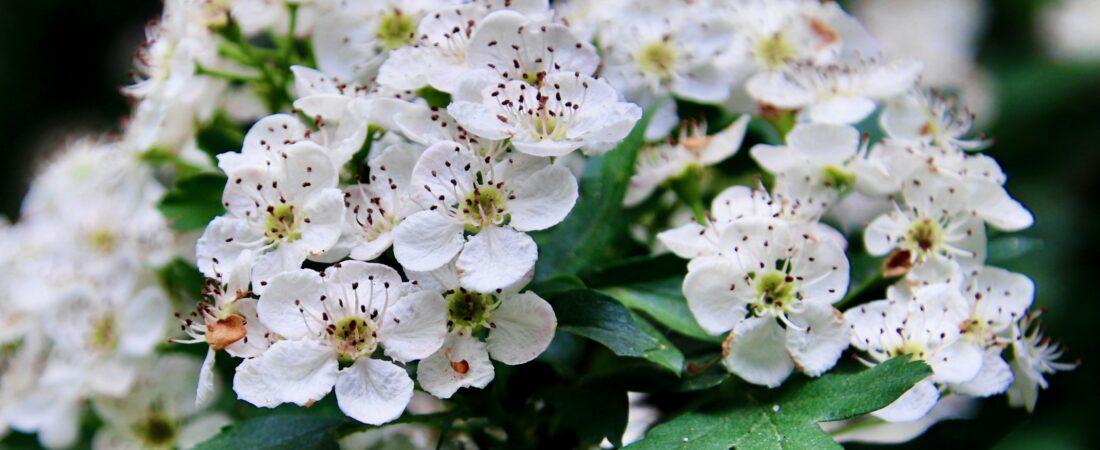Known as one of nature’s most powerful heart tonics, hawthorn (Crataegus spp.) has been revered in herbal medicine for centuries. With its delicate white or pink blossoms, bright red berries, and rich folklore, hawthorn is a deeply spiritual and physically healing herb. It supports cardiovascular health, emotional resilience, and energetic boundaries, making it a unique herb for both body and soul.
In this article, we’ll explore the medicinal properties, historical use, preparation methods, and important cautions of hawthorn—providing a comprehensive guide for both herbal newcomers and seasoned plant allies.
What is Hawthorn?
Hawthorn is a deciduous shrub or small tree belonging to the Rosaceae (rose) family. There are hundreds of species, but the most commonly used for medicinal purposes include:
- Crataegus monogyna
- Crataegus laevigata
- Crataegus oxyacantha
All parts of the plant—berries (haws), leaves, and flowers—are used in herbal preparations. Hawthorn grows throughout Europe, Asia, and North America and is often found in hedgerows, forests, and open fields.
Medicinal Properties of Hawthorn
Hawthorn has a long-standing reputation for its beneficial effects on the cardiovascular system, but its healing potential extends to emotional and spiritual health as well.
1. Heart and Circulatory Health
Hawthorn is one of the most effective herbs for strengthening the heart muscle and improving blood circulation. Its medicinal compounds, including flavonoids, oligomeric procyanidins (OPCs), and vitexin, support:
- Improved coronary artery blood flow
- Stronger and more efficient heart contractions
- Regulation of blood pressure (both high and low)
- Reduced arterial plaque buildup
- Relief from mild congestive heart failure and angina
Scientific studies have shown that hawthorn can improve heart performance in individuals with stage I and II heart failure, making it a valuable adjunct to conventional care.
2. Nervous System and Emotional Wellbeing
Hawthorn is a deeply soothing herb for the emotional heart. Herbalists often recommend it for:
- Grief and heartache
- Anxiety and restlessness
- Emotional trauma recovery
- Stress-related palpitations
Its gentle nervine effects help calm the nervous system while offering a subtle emotional holding space for healing.
3. Antioxidant and Anti-Inflammatory Support
The berries, flowers, and leaves of hawthorn are rich in antioxidants, which help neutralize free radicals and reduce inflammation in blood vessels. This makes hawthorn supportive for metabolic health, especially for those managing:
- High cholesterol
- Type 2 diabetes
- Obesity-related cardiovascular risk
4. Energetic and Spiritual Protection
In folk traditions and energetic herbalism, hawthorn is seen as a protector. It strengthens energetic boundaries, opens the heart chakra, and connects us to the unseen realms. It’s often used in ritual to promote:
- Heart-centered clarity
- Protection from psychic intrusion
- Ancestral connection and portal work
A Rich History of Hawthorn in Herbal and Spiritual Traditions
Hawthorn’s history is steeped in mysticism, folklore, and herbal wisdom. In Celtic and Druidic traditions, hawthorn was one of the most sacred trees, often found growing near holy wells and believed to guard portals to the fae or otherworld.
- In Ancient Greece, hawthorn was associated with marriage and fertility.
- In Medieval Europe, hawthorn was used to ward off evil spirits and protect homes.
- In Traditional Chinese Medicine, hawthorn berries (Shan Zha) are used to aid digestion and circulation.
Throughout Europe, it was known as the “May Tree”, blooming around Beltane (May 1st), a time of fertility, vitality, and heart-centered celebration.
Who Should Use Hawthorn?
Hawthorn is ideal for those who:
- Are looking for natural heart support
- Experience grief, emotional trauma, or anxiety
- Want to enhance heart-brain coherence in meditation
- Need nourishment after burnout or heartbreak
- Are exploring heart chakra or energetic healing
Its gentle strength makes it suitable for both long-term physical healing and subtle emotional shifts.
Cautions and Contraindications
Though hawthorn is a generally safe and well-tolerated herb, there are a few important precautions to be aware of:
1. Medication Interactions
Hawthorn may enhance or interfere with prescription heart medications, including:
- Beta-blockers
- Digoxin
- ACE inhibitors
- Calcium channel blockers
If you are on any heart medications, consult your healthcare provider before using hawthorn regularly.
2. Blood Pressure Changes
Because hawthorn can modulate blood pressure, monitor closely if you have low blood pressure or take medications that affect blood pressure.
3. Pregnancy and Breastfeeding
There is limited data on hawthorn’s safety in pregnancy. While small amounts in tea may be fine, avoid concentrated forms unless under the care of an experienced practitioner.
4. Slow-Acting but Powerful
Hawthorn works best over time. It’s not a quick fix but a nourishing, cumulative herb. Expect benefits to unfold gradually over weeks or months.
Final Thoughts: Hawthorn as a Holistic Heart Healer
Hawthorn is one of the most profound herbal allies for physical, emotional, and spiritual heart health. From strengthening circulation to mending emotional wounds, this sacred tree offers a grounded path toward healing and wholeness.
Whether you’re sipping a hawthorn tea under the full moon, blending it into a heart-calming tincture, or using it to protect your spiritual space, hawthorn invites you into a relationship with your deepest self. In times of grief, stress, or disconnection, it reminds us: you are held, and you are whole.
